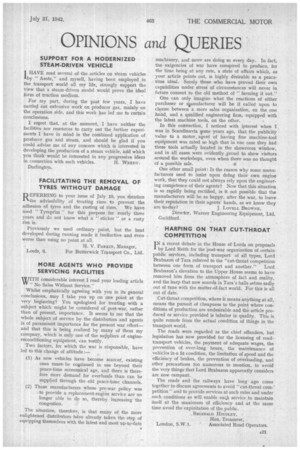OPINIONS and Q UERIES SUPPORT FOR A MODERNIZED STEAK-DRIVEN VEHICLE I HAVE read several of the articles on steam vehicles
Page 23

If you've noticed an error in this article please click here to report it so we can fix it.
by " Azote," and myself, having been employed in the transport world all my life, strongly support the view that a steam-driven model would prove the ideal form of traction medium.
For my part, during the past few years, , I have carried Out extensive work on producer gas, mainly on the operation side, and this work has led rue to certain conclusions.
I regret that, at the moment, I have neither the facilities nor resources to carry out the further experiments I have in mind in the combined application of producer gas and steam, and should be glad if you could advise me of any concern which is interested in developing the production of a steam vehicle, add which you think .would be interested in any progressive ideas
in connection with such vehicles. H. WEEDY. Darlington.
MORE AGENTS WHO PROVIDE SERVICING FACILITIES WITH Considerable interest I read your leading article " No Sales Without Service."
Whilst emphatically agreeing with you in its general conclusions, may I take you up on one point at the very beginning? You apologized for treating with a subject which might be considered of post-war, rather than of present, importance. It seems to me that the whole subject of service by the distributors and agents is of paramount importance for the present war effort— and that this is being realized by many of them my company, which is only one of the sui5pliers of enginereconditioning equipment, can testify.
Two factors, for which the war is responsible, have led to this change of attitude : (1) As new vehicles have become scarcer', existing ones mustbe continued in use beyond their peace-time economical age, and there is therefore more demand for overhauls than can be supplied through the old peace-time channels.
(2) Those manufacturers whose pre-war policy was to provide a replacement-engine service are no longer able to do so, thereby increasing the congestion.
The situation, therefore, is that many of the more enlightened distributors have already taken the step of equipping themselves with the latest and most up-to-date machinery, and more are doing so every day. In fact, the exigencies of war have conspired to produce, for the time being at any rate, a state of affairs which, as your article points out, is highly desirable as a peacetime ideal. Surely those who have proved their own capabilities under stress of circumstances will never in future consent to the old method of " farming it out."
One can only imagine what the reactions of either purchaser or naanufacturer will be if called upon to choose between a mere sales organization, on the one hand, and a qualified engineering firm, equipped with the latest machine tools, on the other.
In this connection, I noticed with interest when I was in Scandinavia rme years ago, that the publicity value to a motor, agent of having fine machine-tool equipment was rated so high that in one case they had these tools actually located in the showroom window, and in all cases were evidently .proud to show visitors around the workshops, even when there was no thought of a possible sale. • One other small point: Is the reason why some manufacturers used to insist upon doing their own engine work, that they could not always rely upon the engineering competence of their agents? Now that this situation is so rapidly being rectified, is it not possible that the manufacturers will be as happy, after the war, to leave their reputation in their agents' hands, as we know they
are to-day? J. LOVELL BROWNE, Director, Warner Engineering Equipment, Ltd. Guildford.
HARPING ON THAT CUT-THROAT COMPETITION I N a recent debate in the House of Lords on proposals by Lord Reith for the post-war organization of certain public services, including transport of all types, Lord Brabazon of Tara referred to the "cut-throat competition, between one form of transport and another." Lord Brabazon's elevation to the Upper House seems to have removed him from .the atmosphere of fact and reality, and the harp that now sounds in Tara's halls sebms sadly out of tune with the matter-of-fact world. For this is all out of date.
Cut-throat competition., where it means anything at all, means the pursuit of cheapness to the point where conditions of production are undesirable and the article produced or service provided is inferior in quality. This is quite remote from the actual condition of things in the transport world.
The foads were regarded as the chief offenders, but legislation has now provided for the licensing of roadtransport vehicles, the payment of adequate wages, the prevention o over-long hours, the maintenance of vehicles irna fit condition, the limitation of speed and the efficiency of brakes, the prevention of overloading, and other precautions too numerous to mention, to avoid the very things that Lord Brabazon apparently considers are now rampant., The roads and the railways have long ago come together to discuss agreements to avoid " cut-throat cornpetition" and to provide services at such rates and under such conditions as will enable eac.h service to maintain itself at the maximum of efficiency and at the same time avoid the exploitation of the public.




















































